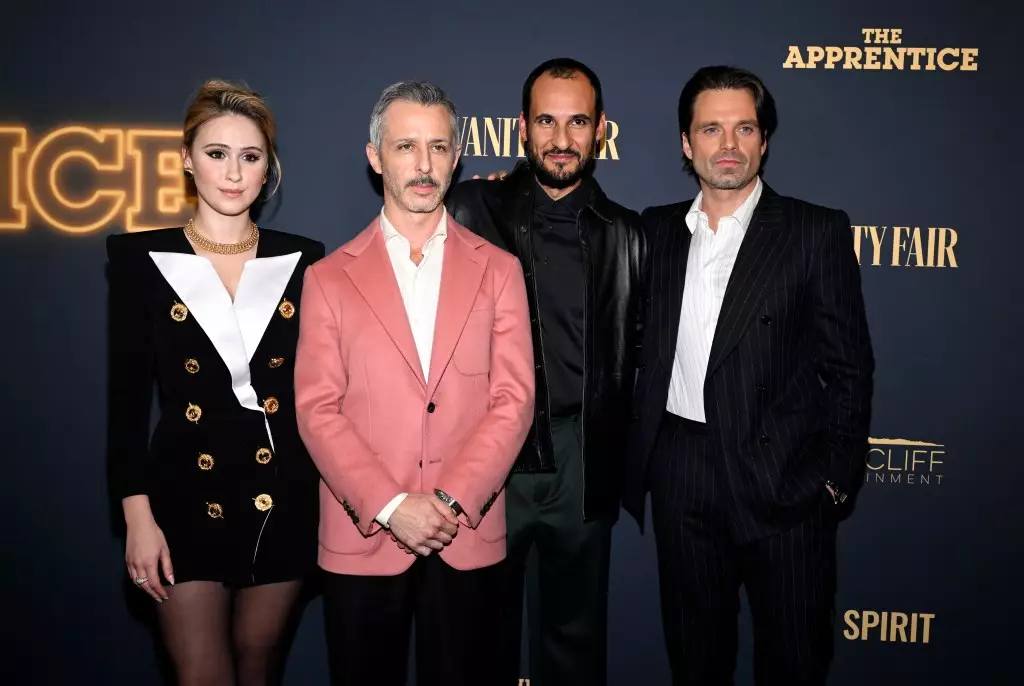The cinematic landscape has long been riddled with challenges, particularly when it comes to navigating the intricate dynamics of film production and distribution. James Shani, founder of Rich Spirit, stood at the forefront of these complexities during the recent premiere of *The Apprentice* in New York City. His elation was palpable as he addressed an audience at the DGA Theater, celebrating not just the film’s launch but the arduous journey it took to reach this point. “We did it,” Shani proclaimed, encapsulating the spirit of determination required to overcome obstacles that at times felt insurmountable.
In a world where art intertwines with commerce, *The Apprentice* faced serious hurdles following the tumultuous exit of its original financier, Kinematics. This painful departure left the film stranded in distribution limbo, a position that could easily spell doom for many projects. The threats of legal ramifications from Donald Trump’s attorneys compounded this drama, presenting Shani and the film’s producers with a daunting task. Perhaps more telling than Shani’s joy, however, was his reflection on the broader implications of his experience, highlighting a troubling trend where industry players hesitate to take risks on controversial subjects.
What makes *The Apprentice* particularly intriguing is its subject matter – a dramatization of Donald Trump’s early business ventures, illustrated through a blend of aspiration and moral ambiguity. The film’s protagonist, portrayed by Sebastian Stan, is a complicated figure; he interacts with the formidable Roy Cohn (Jeremy Strong), who shapes him into a shrewd tycoon. But beneath the glamorous veneer lies a deeply troubling narrative replete with self-serving actions and ethical quandaries.
The complexity of the characters invites deeper reflection on the nature of power and ambition in American society. It’s worth noting that the film doesn’t merely toe the line of traditional biographical storytelling but embraces a more nuanced exploration of its figures – a pipedream for many filmmakers. Abassi’s intent to depict not just Trump’s successes but also his moral failings reveals a commitment to realism in storytelling. This artistic choice serves to raise crucial questions, compelling the audience to confront the semiotic mirror held up by the film, which reflects a society entangled in its own contradictions.
Film and politics have always shared a notorious symbiosis, evolving together, often in ways that illuminate fundamental truths about human nature. It’s intriguing to ponder Abassi’s assertion that he sees beyond the partisan lens that so often muddy political discourse. “I don’t buy this sort of, you know, Democrats are the savior and Republicans are evil,” he remarked, championing the notion that actors on both sides are fundamentally human, deserving of understanding rather than demonization.
Such perspectives divest art of its tendency to starkly categorize subjects and instead highlight the gray areas that characterize the human experience. In a pivotal scene, the film touches on themes of abuse, an aspect that has sparked considerable debate. Abassi recognizes the gravity of this portrayal, citing real-life legal occurrences that lend credence to the dramatization. The reluctance around discussing such subjects indicates a larger societal discomfort, one that must be acknowledged rather than suppressed.
Abassi’s film stands at the intersection of storytelling and cultural examination, but its impact stretches beyond cinema. As the film gears up for its wider release, industry insiders like Tom Ortenberg and journalist Gabriel Sherman stress the importance of audience engagement. “I want to ask you all to please talk about the movie. Please post about it on socials,” Ortenberg urged attendees. This call to action reflects an understanding that the success of any film rests heavily upon audience advocacy.
Critics and viewers alike must consider their role in determining what stories are propagated within the cultural zeitgeist. As Sherman shared his chaotic journey to the Telluride Film Festival, his commitment to the project remains a testament to the passion that coalesces around meaningful artistic endeavors. The combined efforts of Shani, Abassi, and their team underline a critical truth: Art, especially film, often begins as a vulnerable vision, requiring nurturing within an unpredictable industry.
In the end, *The Apprentice* stands not only as a film but as an emblem of the risks inherent in artistic pursuits, particularly in politically charged climates. The film challenges its audience to grapple with the uncomfortable realities of its protagonist’s life. As we venture further into a culture that increasingly demands authenticity, Abassi’s work invites reflection and conversation.
With Shani’s Rich Spirit and various contributors championing this contentious narrative, we must ask: What continues to be at stake for filmmakers brave enough to tread the murky waters of truth-telling in an age of divisive politics? The future of artistic self-expression may hinge upon embracing the very controversies that have often been sidelined in mainstream narratives, and *The Apprentice* serves as a poignant reminder of that challenge.
